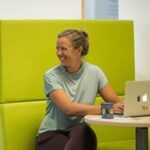A people story from the Analysis Function Diversity & Inclusion Group

My current role in government is as a data scientist, a highly technical role where I am at the interface between domain expertise and statistical expertise (and some computer science knowledge). It poses an interesting tension where I have one voice for my analytical colleagues who share my statistical expertise, and a different voice for my policy colleagues who want to understand impact and the outcomes on people’s lives. I find that my voice has changed throughout the trajectory of my career.
As a pupil at a state faith school, my voice blended in with the socioeconomically diverse demographic typical of Durham. It was an ordinary school, in one of the more deprived areas of the UK. Unusually for my class, I moved away from the North East for university (to beautiful Edinburgh, if you are wondering). But I was in a place that felt both familiar and safe. It still felt like home.
I then started my PhD at one of the UK’s most prestigious universities. Suddenly my background and my voice were rarities. I was surrounded by peers whose parents were successful academics and many had attended private school. This was very different to my background, and it felt like an in-group I hadn’t realised I wasn’t part of. During those early months, I was overwhelmed by a very different language to the one I had both at school and during my undergraduate. It took me some time to re-discover my voice, and even further work to realise that my voice could (and should) be different to those around me at the university.
In many ways, it was this discovery that has set me in good stead for a move to the Civil Service. On entering, I was thrown into a workplace with completely new language to learn, full of acronyms particular to the Civil Service. I remember attending my first stand up (no, I didn’t know what that was either) and my Deputy Director addressing the room with a jumble of words that I definitely recognised as English but could make no sense of at all.
My early career was centred around building my voice to speak confidently about analysis, and how to articulate key findings and limitations. (In academia, it’s impossible to hide from the limitations of your work as there will always be a wizened professor at hand to remind you.) On moving into Data Science, another fundamental difference to most of my colleagues is that I’m female and have a soft-spoken northern accent. This means that I bring a very different voice to the table, and one I struggled to exercise around my colleagues who were much more confident in giving their thoughts where I would insist on going back to the literature before committing any opinion. One thing I have learnt, is that often from this position you are more likely to be listened to when you do speak up.
It has taken me some time to develop my voice as a data scientist, and I now believe I have learnt how to use it more effectively although I still have plenty of room for improvement! I have realised that my background is one of my strengths. Like many around me, I’m a civil servant because I like to think I’m improving the lives of our public and one part of that is trying to represent those I grew up with in Durham. In all this, I have worked to build a voice that champions collaboration and tries to continue to represent the background that has built me into the analyst I am now.
Now, I have the privilege of doing this from 10 Downing Street. Our Data Science team is led by a female director who is a brilliant role model, and I have several female colleagues I work alongside. By necessity, my voice has changed once more, as I learnt to work more closely with policy colleagues. They have different expectations and needs from my analysis – ‘How can I use your advice to improve my policy?’ This has pushed me from a more academic interest in evidence, to better evaluate the answer that ‘so what?’ question I often receive. This new challenge reminds me to explore different perspectives and ensure I provide my colleagues with as impartial advice as I can.
I still reflect on my background and the journey that has got me here. I believe it has helped me to start demonstrating how we can push against preconceptions and boundaries, honestly evaluating policy and be willing to be a voice for change. (All very easy to say and very difficult to achieve, but I can aspire towards this!) The change I look for is one where we place evidence at the forefront of decision making and ensure that evidence is reflective of the experiences of our society in the UK, including that school in Durham.
In celebration of National Inclusion Week 2021, the Analysis Function have launched our first inclusion toolkit. Government employees can ask for a copy of the toolkit by emailing Analysis.Function@ons.gov.uk. You can explore this topic more by reading the AF Diversity and Inclusion strategy.
